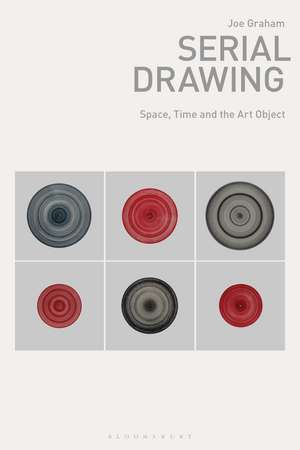Serial Drawing: Space, Time and the Art Object: Drawing In
Autor Joe Grahamen Limba Engleză Paperback – 15 mai 2024
| Toate formatele și edițiile | Preț | Express |
|---|---|---|
| Paperback (1) | 187.26 lei 3-5 săpt. | +49.11 lei 7-13 zile |
| Bloomsbury Publishing – 15 mai 2024 | 187.26 lei 3-5 săpt. | +49.11 lei 7-13 zile |
| Hardback (1) | 541.54 lei 3-5 săpt. | |
| Bloomsbury Publishing – 22 sep 2021 | 541.54 lei 3-5 săpt. |
Preț: 187.26 lei
Preț vechi: 216.43 lei
-13% Nou
Puncte Express: 281
Preț estimativ în valută:
35.83€ • 37.41$ • 29.66£
35.83€ • 37.41$ • 29.66£
Carte disponibilă
Livrare economică 15-29 martie
Livrare express 01-07 martie pentru 59.10 lei
Preluare comenzi: 021 569.72.76
Specificații
ISBN-13: 9781350464117
ISBN-10: 1350464112
Pagini: 216
Ilustrații: 21 bw illus
Dimensiuni: 156 x 234 x 16 mm
Greutate: 0.45 kg
Editura: Bloomsbury Publishing
Colecția Bloomsbury Visual Arts
Seria Drawing In
Locul publicării:London, United Kingdom
ISBN-10: 1350464112
Pagini: 216
Ilustrații: 21 bw illus
Dimensiuni: 156 x 234 x 16 mm
Greutate: 0.45 kg
Editura: Bloomsbury Publishing
Colecția Bloomsbury Visual Arts
Seria Drawing In
Locul publicării:London, United Kingdom
Caracteristici
Rigorously explores drawing via contemporary trends in art and philosophy, revitalizing the subject
Notă biografică
Joe Graham is Assistant Professor in Visual Communication Design at Kadir Has University, Istanbul.
Cuprins
List of FiguresIntroduction1. A History of Definitions2. An Object-Oriented Approach3. Serial DrawingConclusion: Seeing Serially
Recenzii
Although object-oriented ontology (OOO) has put a great deal of effort into discussing problems of aesthetics, what Joe Graham does in this book is something completely new: he develops the first theory of object-oriented seriality in art. Better yet, he does so with one of the most lucid treatments ever seen of OOO's fourfold object model. I'll be sifting through the implications of this book for a long time to come.
This is a rewarding read and a much needed contribution to debates within the field of serial art. Graham asks what kind of an art object is a serially developed drawing and how is it seen and understood? Through a focussed consideration of serial drawings by Ellsworth Kelly, Alexei Jawlesky, Hanne Darboven and Jill Baroff, Joe Graham deftly leads us into the concept of 'seeing serially' in order to contemplate the performative nature of encounters between viewers and serial artworks.
This book revitalizes drawing as a prime means of developing an intelligence of seeing. Drawing practices, traditionally constrained between representationalism and expressionism, are here articulated through the author's theory of object-oriented seriality, a means to realising the visual potential of the dialectic between objectivity and subjectivity over the passage of time.
Serial art, one may assume, invites little variation in definition, form or theoretical premise. Joe Graham proves differently. After discussing a surprisingly varied range of philosophical definitions of seriality, he establishes grounds for a theoretical position for an embodied mode of serially seeing. As such, (art) objects presenting themselves as serial teach us rather than letting us impose content. This act of seeing privileges an understanding of systems and structures over meaning. Graham's investigation leads us to understand why Harman's object-oriented ontology is indispensable as an aesthetic mode for the 21st century, making us appreciate what emerges and simultaneously withdraws when contemplating art. Nothing is better suited to test this mode than drawing, as (to quote the author) it uniquely combines 'visible material and formal qualities [.] with a conceptual underpinning [.] inherent to serial structure and order'. To which end Graham modifies Harman's ontology and reconfigures it, to correspond to the serial character of drawing, challenging the viewer to overcome passive consumption with the embodiment of active perception.
This is a rewarding read and a much needed contribution to debates within the field of serial art. Graham asks what kind of an art object is a serially developed drawing and how is it seen and understood? Through a focussed consideration of serial drawings by Ellsworth Kelly, Alexei Jawlesky, Hanne Darboven and Jill Baroff, Joe Graham deftly leads us into the concept of 'seeing serially' in order to contemplate the performative nature of encounters between viewers and serial artworks.
This book revitalizes drawing as a prime means of developing an intelligence of seeing. Drawing practices, traditionally constrained between representationalism and expressionism, are here articulated through the author's theory of object-oriented seriality, a means to realising the visual potential of the dialectic between objectivity and subjectivity over the passage of time.
Serial art, one may assume, invites little variation in definition, form or theoretical premise. Joe Graham proves differently. After discussing a surprisingly varied range of philosophical definitions of seriality, he establishes grounds for a theoretical position for an embodied mode of serially seeing. As such, (art) objects presenting themselves as serial teach us rather than letting us impose content. This act of seeing privileges an understanding of systems and structures over meaning. Graham's investigation leads us to understand why Harman's object-oriented ontology is indispensable as an aesthetic mode for the 21st century, making us appreciate what emerges and simultaneously withdraws when contemplating art. Nothing is better suited to test this mode than drawing, as (to quote the author) it uniquely combines 'visible material and formal qualities [.] with a conceptual underpinning [.] inherent to serial structure and order'. To which end Graham modifies Harman's ontology and reconfigures it, to correspond to the serial character of drawing, challenging the viewer to overcome passive consumption with the embodiment of active perception.






